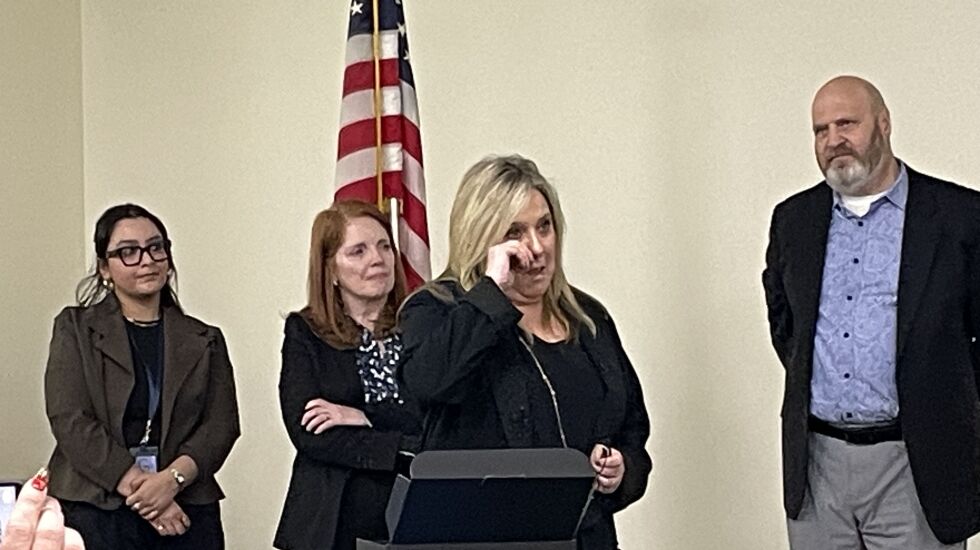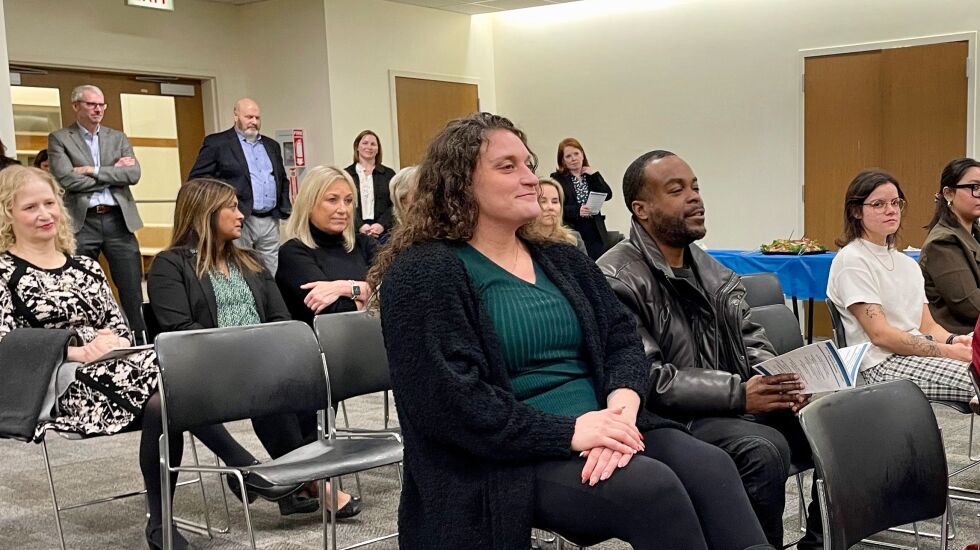
You don’t often see a judge cry.
But Cook County Circuit Court Judge Lauren Edidin was repeatedly brushing away tears on Thursday — though she would be quick to point out it was not in her own courtroom but at a decidedly emotional event: the latest graduation ceremony of the Skokie Mental Health Court.
“I’m really going to try not to cry,” she told those gathered at the 2nd Municipal District courthouse in Skokie.
Mental Health Court is one of three types of Cook County’s 20 “problem-solving courts.” The other two are veterans court and drug court. Rather than trying to punish non-violent offenders — the accused must plead guilty to participate — these courts try to address the problems that pave the way for criminality.
The work is time-consuming, often frustrating, occasionally rewarding environments where members of the legal community band together, often in their spare time — Edidin was praised for devoting her vacations to the effort — to help disentangle those caught in the legal system.
“We help participants learn how to live and succeed with their illness,” Edidin said. “This program exists to help participants find long-term housing, set up treatment plans, receive job training, obtain insurance and Social Security benefits. The program formulates individual plans, based on participants’ specific needs.
“That is so important. With that, they have a higher likelihood of success. Our program supports participants with kindness, understanding, tough love and encouragement,” she said.
Emotions were high not only because Deborah L., Ashur N., Lamont O. and Kathy R. were celebrating their exit from the criminal justice system, but Edidin was retiring after 12 years on the bench. That was why Chief Judge Timothy Evans took the time to be there, along with about 50 fellow judges, public defenders, assistant state's attorneys, staffers and family members.

Also present was Margaret Byrne, a filmmaker whose “Any Given Day” is a documentary on three mentally ill Chicagoans and featuring Edidin and the Mental Health Court.
“It was used as professional development for Cook County judges,” Byrne said. “That was something I was really proud of.”
The movie won the Chicago Award at the 2021 Chicago International Film Festival. It’s available for the next month on PBS World Channel and is well worth watching.
Mental illness can be a bleak subject, but Byrne’s film gets viewers past that.
First, it’s just beautiful to look at — the way she frames scenes, diving the screen in interesting ways, projecting the passage of time, which is an essential quality experienced by those trying to escape the chutes and ladders maze of mental illness.
Second, how she builds interest in her three subjects, tracking their peaks and valleys.
Dimitar Ivanov, straight-arming paranoia. “The robots are after me sometimes,” he explains.
Angela Roach-Pena, who balks at taking her medications because they are “against my beliefs” but will smoke PCP. The image of her 5-year-old son, stirring a pot of toy cars, is one of the more jarring in the movie that underscores the toll mental illness extracts from loved ones.
And Daniel Brown, who was present in the courtroom, having turned his life around, gone to culinary school and now hoping to open a food truck.
“I been on the bottom,” Brown says in the movie. “Now, I feel I’m a part of the human race.”
The ceremonies were a reminder of just how big small victories can be. Introducing each graduate, Edidin stressed a particular achievement — moving into their own apartment, holding a job, staying sober.
But first and foremost in each case was the graduate “never violated probation!” and by the third time Edidin said it, you realized just how many people can’t even achieve basic compliance in their quest to get right with the law.
“I’ve been in trouble since I was young,” said Lamont O. in the brief remarks that each graduate made, adding he is now poised to “keep doing right, stay on track.”
Judge Sharon Cantor will be the new head of mental health court.
Byrne is now working on a film about a string of wrongful convictions tied to one retired homicide detective.
In “Any Given Day,” she folds herself in among the mentally ill whose lives she chronicles.
“I figured out that the things I worked so hard to hide, don’t need to be hidden,” she says. “That there’s power in connecting ... Success does not just look like one thing. Success is a journey.”







